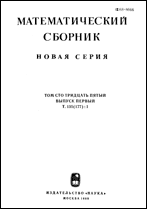|
This article is cited in 4 scientific papers (total in 4 papers)
On a connection between Hughes' conjecture and relations in finite groups of prime exponent
E. I. Khukhro
Abstract:
Under the assumption that the ideal of relations of a free 3-generator group of period $p$ does not coincide modulo $p$ with the $(p-1)$-Engel ideal it is proved that there exist $p$-groups $P$ of nilpotence degree $2p-1$ in which the index of the Hughes subgroup $H_p(P)$ is $p^2$ (Theorem 1). The author also finds that Macdonald's result on $p$-groups of class $2p-2$ is best possible (at least for $p=5,7,11$). The proof is based on direct computations almost the same as in work of A. I. Kostrikin dating from 1957; it uses properties of the coefficients in the Baker–Hausdorff formula.
An automorphism $\varphi$ of order $p$ of the group $G$ is called splitting if $xx^\varphi x^{\varphi\,2}\dots x^{\varphi\,p-1}=1$ for all $x$ in $G$. It is easy to see that $G\ne H_p(G)$ if and only if $G=G_1\langle\varphi\rangle$, where $\varphi$ is a splitting automorphism of order $p$ of $G_1$. It is proved that if a finite $p$-group $P$ admits a splitting automorphism $\varphi$ of order $p$ and the nilpotency degree of $P\langle\varphi\rangle$ does not exceed $2p-2$, then $P$ is regular (Theorem 2). From Theorem 2 it is possible to deduce an independent proof of Hughes' conjecture for $p$-groups of class $2p-2$.
On the basis of Theorem 1 the author constructs examples of $p$-groups admitting a splitting automorphism of order $p$ for which the associated Lie ring is not a $(p-1)$-Engel ring.
Bibliography: 12 titles.
Received: 03.10.1980
Citation:
E. I. Khukhro, “On a connection between Hughes' conjecture and relations in finite groups of prime exponent”, Math. USSR-Sb., 44:2 (1983), 227–237
Linking options:
https://www.mathnet.ru/eng/sm2462https://doi.org/10.1070/SM1983v044n02ABEH000963 https://www.mathnet.ru/eng/sm/v158/i2/p253
|


|




 Contact us:
Contact us: Terms of Use
Terms of Use
 Registration to the website
Registration to the website Logotypes
Logotypes








 Citation in format
Citation in format 
